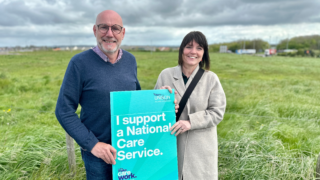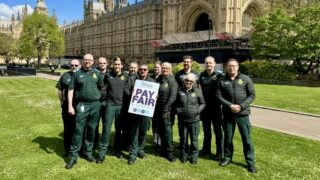Use £235m of extra business rates to ease South West social care crisis, UNISON tells Chancellor
The government could ease the social care crisis by handing back to councils in the South West millions in surplus cash raised from business rates, according to new figures published today (Wednesday) by UNISON.
If local authorities in the South West were given back their share of business rates that have been collected by the government, this would mean an extra £235m to spend on social care, says UNISON.
UNISON’s calculations are based on the same funding formula for the government’s Better Care Fund, which allocates resources to the NHS and local authorities.
If the government were able hand back a proportion of business rates for South West local authorities to spend on social care, local council taxpayers would benefit too, says UNISON.
The extra business rates cash would remove the need for local authorities to raise council tax by two per cent* to spend on social care, saving South West residents £45m a year, says UNISON.
UNISON says many more people would be able to receive care in the region under its proposal. Devon County Council would get £28m more to spend and taxpayers would save £6.6m (because money from business rates would avoid the need for council taxes to rise). Similarly Dorset County Council would get £15m, saving its taxpayers £4m a year.
With business rates to spend on social care, South Gloucestershire Council would have another £7.2m to spend, saving its council taxpayers £2.3m. Plymouth City Council would gain £10m, saving nearly £2m for local taxpayers. Cash-strapped Bristol City Council would benefit too, with an additional £15.5m for social care while putting £3.5m back in the pockets of local ratepayers.
UNISON South West regional secretary Joanne Kaye said: “The social care system is in dire straits. There’s simply not enough money to fund the care that’s needed.
“The losers are the thousands of dedicated homecare workers, who work long hours, and whose already low wages are dragged below the legal minimum because of the non-payment of travel time.
“Those suffering the most are the elderly and the disabled, who rely on daily visits so they can stay in their own homes. Visits are often too short to administer the care needed, or care packages simply aren’t available. Then people have to stay in hospital far longer than is good for them, in beds that are desperately needed for other patients.
“Investing £235m in social care would be money extremely well spent. Not only would it mean better care for the elderly, it would ease the pressure on homecare staff, and free up beds in the NHS.”
Last week UNISON general secretary Dave Prentis wrote to Philip Hammond setting out where the autumn statement could make a real difference to public services. The Chancellor could:
- End public service job cuts, where fewer staff are trying to do more with less resources.
- Fully fund student nurse bursaries, giving the NHS a better chance of recruiting the additional health professionals it needs.
- End the one per cent public sector pay cap, which has caused money worries for many public servants.
Further info
| Local authority | Column B | Column C | Column D Extra money raised by UNISON proposal £m |
| UNISON proposal Share of £2.4bn growth in business rates surplus £m | Council tax social care precept £m | ||
| Devon | 34.6 | 6.6 | 28.1 |
| Cornwall | 26.4 | 4.8 | 21.5 |
| Gloucestershire | 25.3 | 4.8 | 20.5 |
| Somerset | 23.7 | 4.0 | 19.7 |
| Bristol | 19.0 | 3.5 | 15.5 |
| Dorset | 19.2 | 4.0 | 15.1 |
| Wiltshire | 18.7 | 4.4 | 14.3 |
| Plymouth | 11.9 | 1.9 | 10.0 |
| North Somerset | 9.3 | 1.8 | 7.5 |
| South Gloucestershire | 9.5 | 2.3 | 7.2 |
| Bournemouth | 8.5 | 1.5 | 7.0 |
| Swindon | 8.0 | 1.6 | 6.4 |
| Torbay | 7.3 | 1.1 | 6.1 |
| Bath & North East Somerset | 7.4 | 1.5 | 5.8 |
| Poole | 6.5 | 1.4 | 5.1 |
| Isles of Scilly | 0.1 | 0.0 | 0.1 |
| Total | 235.3 | 45.3 | 190.0 |
– Column B: UNISON proposal for 2017/18 share of £2.4bn adult social care grant by council using the Better Care Fund (2016/17) distribution model.
– *Column C: 2017/18 social care expenditure financed by 2% council tax social care precept.
– Column D: Extra money for social care in 2017/18 under UNISON’s business rates proposal.
– UNISON’s recent report Investing in Social Care, which explains the proposals in more detail, is available here.
– An interactive map of England showing figures for each local authority is available here.
– The government expects to receive a £2.4bn windfall from business taxes next year, and for the two following years. This is because it now receives more in business rates from English local authorities than it pays out in revenue support grant. This ‘surplus’ has yet to be allocated for specific spending by ministers and investing it in social care would be the best possible use of the money, says UNISON.
– *In the 2015 spending review George Osborne allowed English local authorities to increase council tax by an extra two per cent a year, if it was spent on social care. But it means councils in richer areas raise more money. For example, Hackney has a social care budget of £65m and can raise £1.3m, whereas Richmond upon Thames has a budget of £65.6m and gets £2.2m from the precept.
Media contacts:
Fred Jerrome T: 0117 968 9452 T: 07816 538199 E: f.jerrome@unison.co.uk
Alan Weaver T: 0207 121 5555 M: 07939 143310 E: a.weaver@unison.co.uk



